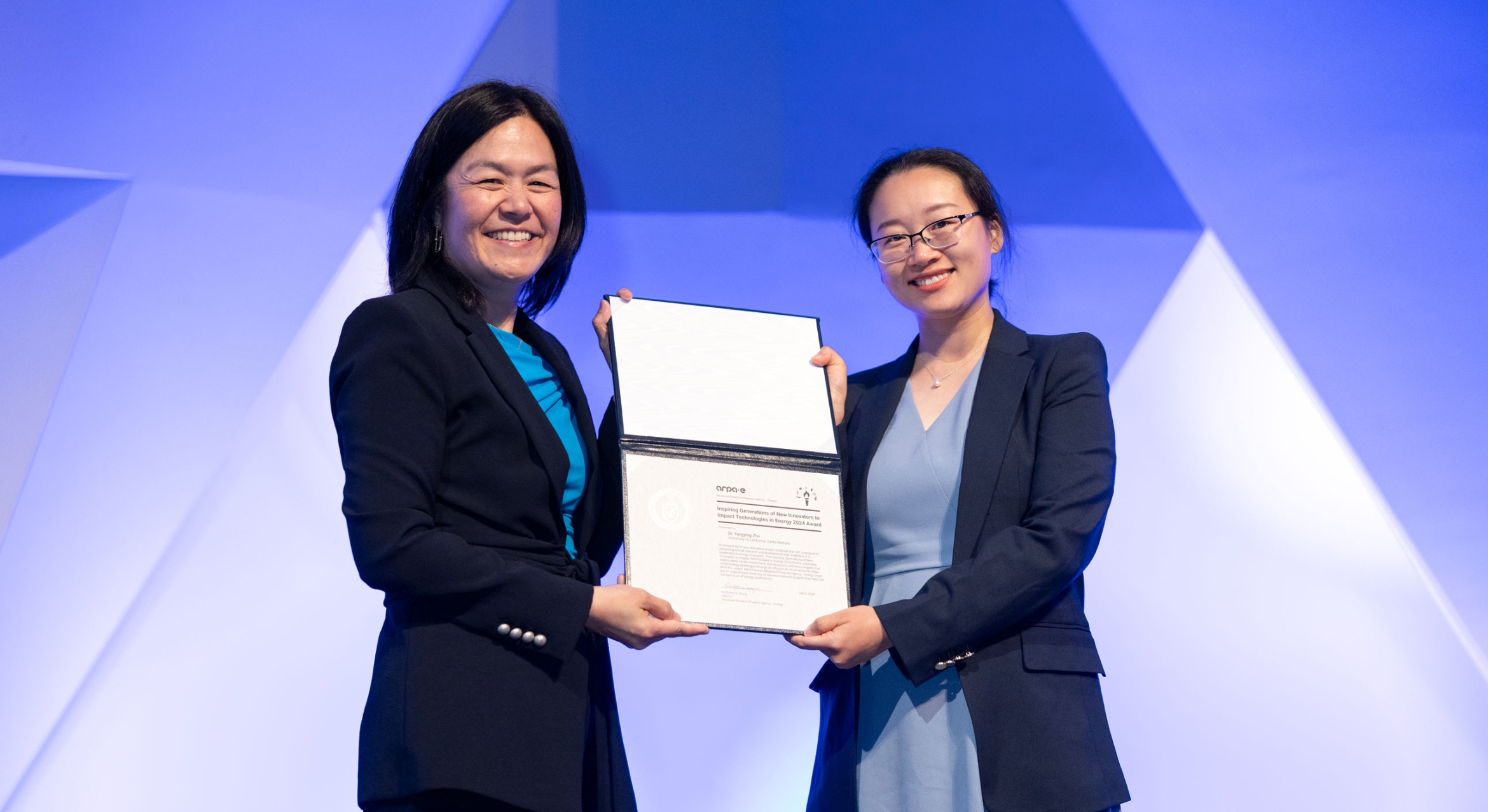
Making desalination more efficient, by way of renewable energy
With freshwater becoming an ever scarcer resource, desalination of ocean water is increasingly employed to bridge the gap between supply and demand.. However, desalination is energy-intensive, often powered by fossil fuels, so meeting the need for freshwater can exacerbate the challenge of reducing atmospheric CO2, the main driver of climate change.
Yangying Zhu, an assistant professor in the Department of Mechanical Engineering at UC Santa Barbara, wants to address that conundrum. Now, a two-year, $500,000 seed grant from the Advanced Research Projects Agency-Energy (ARPA-E) within the U.S. Department of Energy (DOE) will make it possible for her to start the work. The grant was provided as part of Inspiring Generations of New Innovators to Impact Technologies in Energy (IGNIITE 2024) a new ARPA-E program focused on supporting early-career scientists and engineers to convert disruptive ideas into impactful energy technologies, with an eye toward bringing promising technologies to market.
“It’s not the typical kind of funding from ARPA-E, which usually gives much larger grants that require multiple PIs and industry collaboration,” Zhu said, adding that this is the first time the agency has funded early-career single-investigator research. “Instead of being solely focused on fundamental discoveries, this one is focused on supporting ideas that align with the ARPA-E mission of improving energy efficiency and sustainability for the United States.” The agency received 400 applications for the highly competitive grants, selecting 23 for funding. Of those, 13 were from academia, with the rest in industry, startups and national labs.
“Securing one of the first-ever ARPA-E single-researcher grants is a tremendous achievement for Zhu, one of our extraordinary junior faculty members,” said College of Engineering Dean Umesh Mishra. “It reflects so well both on her and on the college, where we support one another in effective and timely ways, including with small seed grants like the one she received that provided a spark for this idea. We are extremely proud of this major accomplishment and now look forward to the evolution of the important energy-saving technology she will pursue.”
“It’s surreal to be in the first group to receive these awards,” Zhu said. “I feel very lucky to have been selected after a demanding application process that involved submitting a concept paper, giving an in-person poster and presentation about the proposal and then submitting a full proposal.”
The rigorous process reflects how seriously ARPA-E takes energy efficiency, as well as the significant long-term support it is prepared to provide for technologies that appear promising after the seed-grant stage.
Zhu has two main objectives in her project. “We first want to improve the energy efficiency of the thermal distillation desalination process compared to the current state of the art,” she said. “Second, we want to use renewable energy — either solar or waste heat from industry, such as that from power plants and data centers — to power the process. So, we are targeting both energy efficiency and reduced dependence on fossil fuels.”
To do that, Zhu, who has expertise in heat and mass transfer, plans to develop “a novel architecture” that optimizes both of those elements for the desalination process, she said. “Our targetis two times the energy efficiency, which would reduce energy consumption by half.”
Conventional thermal distillation, which is accomplished by evaporating saltwater to obtain pure water vapor and then condensing the vapor back to liquid, consumes thermal energy to heat the bulk saltwater for distillation. Zhu is proposing to engineer microstructured materials that will enable the system to achieve evaporation by delivering heat directly to the liquid-vapor interfaces, without relying on energy-intensive heat transfer through the bulk fluid.
As Zhu and her team develop their efficient thermal-distillation process, she will also receive support from ARPA-E scientists and experts in business. “I look forward to learning from the experts within ARPA-E for the next two years,” she said.
That interaction includes an annual weeklong visit to ARPA-E headquarters in Washington, D.C., to network with agency experts who support the program. “I hope that with the mentorship and support from ARPA-E this project will grow into a sustainable long-term collaboration,” Zhu said. “I’m also very excited to receive mentorship from ARPA-E in terms of technology-to-market transfer because junior faculty usually don't have a lot of experience with that.”
The project might not have happened, Zhu noted, if not for an initial $50,000 seed grant she received from the Institute for Energy Efficiency at UCSB in 2021, which provided support for a postdoctoral researcher who worked with her on the initial proof of concept. Also critical was a California Nanosystems Institute (CNSI) Climate Innovation postdoc fellowship in 2023, which helped Zhu and her team generate preliminary data on market feasibility. “I'm really grateful for these campus seed-grant opportunities,” she said. “They're not big, but they get you time to think and some freedom to pursue the idea.”
Those smaller grants positioned Zhu to receive this new ARPA-E grant, which gives her a shot at expanded future support should the project go well, and the distinct opportunity to make significant gains in the efficiency of desalination technologythat will likely play a critical role in the future.



